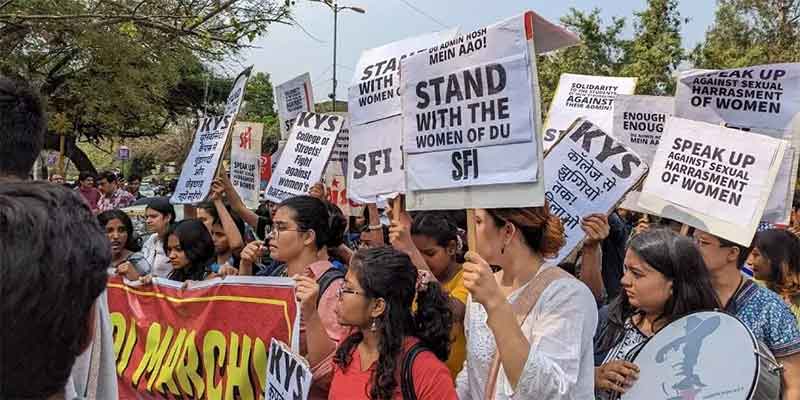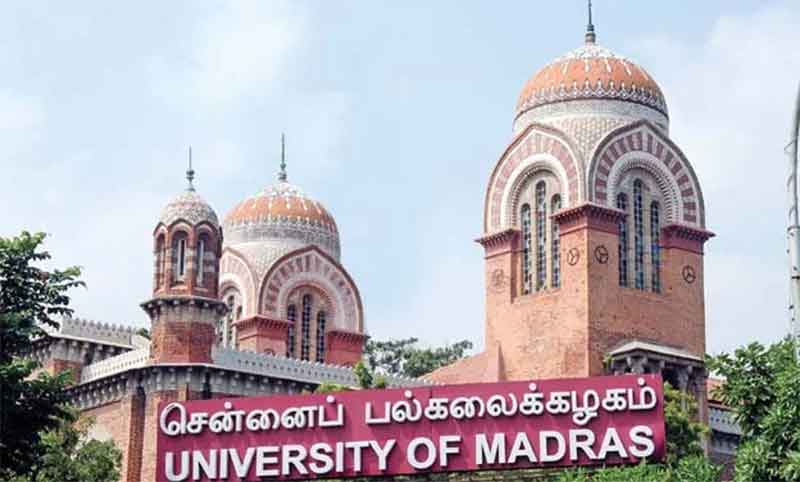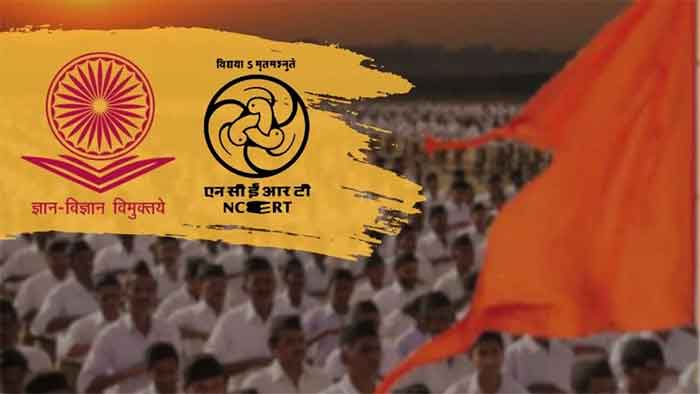Indraprastha College’s failure to protect its women from sexual harassment in its centenary year. If it cannot protect, how will it educate?

Education is an instrument of fiqr (rationality), ziqar (thought and observation), ijtihad (critique and forming of independent opinions), and above all, social transformation and economic advancement. Annie Beasant’s commitment to women’s issues and women’s education inspired the foundation of Indraprastha Hindu Girls School in Delhi in 1904. Initially, it opened to only Hindu girls above the age of five, ensured strict purdah. As early as 1906, Brahmins, Kshatriyas, Kayasthas, Jains and Vaishyas sent their daughters to the school. From 1908 onwards, the numbers swelled with girls from Khatri, Rajput, Jat and Sikh families.
The changes in the cosmopolitanism in Delhi, after being declared as India’s Capital, provided encouragement to the transformation of Indraprastha School into an intermediate College in 1925. The first Muslim student of the College Tehzib Sarbuland Jang, daughter of Nawab Sarbuland Jang of Delhi joined the College in 1930. In 1947, it was recognized as a Degree College. The Board of Trustees of the College were advised to reconstitute and governing body in include sufficient ratio of representatives from every community along with Hindus. The College broke many barriers in this period, like appointing Nirmala Sherjung, a lecturer in Psychology, when it was not taught as a separate discipline. She was also the first married woman to be appointed for lecturer’s position. Until then, only single women were appointed as lecturers.
Interestingly, the College imbibed the spirit of ‘Inquilab Zindabad’ as India became increasingly involved in the Second World War: the students of the College mobilized themselves to oppose and challenge British Imperialism. By 1950, when the College celebrated Silver Jubilee, it showed the making of strong, confident and socially responsible women who fought the purdah system, broke the norms of patriarchy and ferociously took part in national politics.
After independence, the indigenization of education involved three major themes. The first theme was prescribed by Rabindranath Tagore, where he called upon to confront colonialism by internationalism instead of nationalism. “Where the mind is without fear, and the head is held high, where the world is not broken up into fragments by narrow domestic walls,” he reiterated. The second theme evolved through Gandhi’s ideation of Nayi Talim (New Education) which was to help the colonized citizen achieve economic as well as political liberty. The third theme came from values and more of religion, ‘saffronisation’ being one of them. Saffronisation is an Indian political neologism named after saffron robes worn by Hindu ascetics, but is more of political ideology of hindutva in action, as stated by Navneet Sharma and Showkat Ahmad Mir in their essay titled ‘Decolonizing education: Re-schooling in India.’
Saffronisation in the Centenary Year
Unfortunately, the audacious spirit of the women and teachers of Indraprastha College for women, currently in its centenary year, is facing the repercussions of the third theme: saffronisation. It started with the boundary walls of the College being painted saffron, a move that was questioned in a petition to the new Principal Prof. Poonam Kumria on April 20.
The petition started with “It has come to our notice that the boundary walls of Indraprastha College for Women have been painted a reddish-saffron colour, with unrelated artwork, instead of the original plain pastel cream. We have also noted that the wall has a revised logo of the college. These developments, based on unilateral decisions and a non-consultative process, are in contravention of government regulations. In 2002, IPCW was conferred Grade 1 Heritage status, with its concomitant responsibilities, by the office of the Lieutenant-Governor of Delhi. Delhi University has many heritage buildings, including the VC’s current office, which are being duly preserved for their original aesthetic and historical significance. We hope this letter will alert you to the importance of preserving and nurturing the spirit and symbols of Indraprastha College for Women and that you will ensure that the heritage and legacy of the college will be preserved.” The petition was signed by several renowned alumnae of the College like Aruna Roy, Narayani Gupta, Amalina K. Dave, Kiran Mittal as well as Swapna Liddle (Historian with specialization in Delhi), social worker Monisha Behal, writer Natasha Badhwar. The request of 108 signatories was not taken into cognizance by the administration.
“Be it Saffronisation or colouring of whole education process is detrimental. We saw it in USSR, China (during the days of cultural revolution), Iran, U.S. government during the time of Senator Joseph McCarthy. Such processes would have a detrimental impact on the very sense of scholarship. Disinterested, dispassionate pursuit of truth would vanish, as the unpalatable part will be censored. In India, the attempt to turn the process of knowledge creation and dissemination to saffron idea of India, world and life is an RSS idea of knowledge. It is being done in three ways. First, by controlling of curriculum. Secondly, by appointing lecturers who are loyal to the ideology and can act as propagandists to indoctrinate students. Thirdly, by controlling of governance of higher education and universities,” said Apoorvanand, professor at the Hindi Department, Faculty of Arts, University of Delhi.
“The overall paradigm shift of the education sector embedded in a Saffronised India might be a step forward towards further Hinduisation of the very scope of higher education, one that posits the risk of marginalisation on an exponential plane that would affect more than minority communities and a confined, distinct category of educational curricula,” wrote Titas Biswas, from Jadavpur University in his essay titled ‘Pedagogical Curricula and Educational Media: The Malignancy of Saffronised Otherisation in India.’
Any debate on Saffronisation of the College is deemed as ‘defamatory’, without a dialogue with the critics, who are blatantly ‘othered’ by the College or unscrupulously ‘banned’ from entering the premises. The proofs of such scaremongering tactics is used by the administration, which is unable to differentiate between it and the College community, which has 100 years of history.
Silencing of Dissent
On 28th March, hundreds of thousands of men stormed during the Annual Festival ‘Shruti’ of the College, resulting into a series of cases of sexual harassment. Drunk men infiltrated the campus, shouting slogans such as ‘Jai Shree Ram, ‘Ladki dekhne aaye hain, ladki dekh ke jayenge’
The aggrieved students mentioned how their dignity as young girls had been repeatedly and shamelessly violated through multiple acts of groping and manhandling through social media, strikes and demonstration. The sheer negligence, apathy and incompetence displayed by College Administrative body headed by Principal Poonam Kumria, who reached the stampede situation 30 minutes late, and asked the girl volunteers to ‘get the girls out’. The Internal Complaints Committee (ICC) of the College received more than 220 complaints of physical injury, sexual assault, mental health. The ‘limited proceedings held in this case’ led to the resignation of the then external member Advocate Priyanka Goswami. The report was not submitted within 90 days with proper signatures of all the members of the ICC. A new committee which was formed on September 16, does not have any Advocate but rather an Assistant Professor from faculty of Law, University of Delhi.
Since then, the College has appointed six advisors for the Student’s Union even though an elected student’s body was never formed this year. ‘Active practices of most of the student societies have stopped and many have been dissolved, while NSS remains active. All projects taken by Millennium fellowship by the United Nations Academic Impact have stopped. Students do not have access to their society’s social media. There is no single society where students have autonomy. The College’s constitution has been breached,’ mentioned a current student.
The students who have questioned administration have either been suspended or their parents have been summoned on charges of defamation or ‘Anti-College Activity’. They have been denied LoRs for raising questions, and the College Administration has unilaterally called these as ‘Anti-College Activities.’ The constitution of what is ‘Anti-College Activity’ has not been disclosed by the administration.
In stark contrast, one of the retired professors reminisced about the bygone eras of IP. “IP was a place where one could debate new ideas. It provided us the space to learn, unlearn and grow. There was no sense of surveillance, in fact we felt encouraged and nurtured. In the 80s and 90s, we participated in and heralded so many campaigns, on women’s issues, organised rallies, street plays etc. We agitated against custodial rape, dowry, communalism. These activities transformed not only our lives but also that of our students,” said Dr. Neeraj Malik, retired faculty.
“When I joined IP in 1984 as a young lecturer, it was perhaps one of the most divisive moments in history then. After the anti-sikh riots, there could have been a clampdown in the College. I give credit to the then administration that our Principal Sheela Uttam Singh, not only allowed teachers to take leave for participating in rehabilitation of Sikh community and help children with PTSD, but also allowed the College to be at the forefront. We visited relief camps in Mongolpuri, Sultanpuri, around Yamuna, filed petitions for compensation of victims. The saffronization culture, since 2014, could have been prevented, watered down. Culture of fear has overtaken IP College, especially when individual colleges can stand as vanguards’ said Devalina Kohli, retired faculty.
Displacement of Adhocs: An Attack on Womens’ Labour
The story of IP, since February 2023, has been that of systemic failure bolstered by authoritarianism and prejudice. Not only have students been threatened and their voices stifled, as if to infantilise the very spirit of women, but faculty members who have attempted to address these issues have also been systematically side-lined, or, as in my case, displaced. The entire procedure of permanent appointments has been a farce in such cases wherein people have either faced unwarranted humiliation in the interviews, in the guise of questions that challenge their patriotism, or else been replaced by those who have little or no teaching experience, and have very few or no publications to their name. The lack of transparency in the recruitment process, where 1000-1500 applicants appear for two minute interviews, is in itself a case of smoke and mirrors.
Most of the adhocs who have been displaced are women, which should be scrutinised in the larger framework of attack on women’s labour. While one understands that an ad hoc faculty member is never guaranteed a permanent position, the lack of transparency in the proceedings, and the brazen prejudice, based on identity and ideological leaning, has only reinforced the fact that appointments have been made on the basis of all but merit.
The entire procedure of interviews has been a method of elimination rather than evaluation. This has not only affected the mental and social health of those who gave their life and soul to the institution, but has also established mediocrity as the norm, the repercussions of which students are facing, and will continue to face, in the years to come. The staff association, an organisation that is supposed to protect the interest of the faculty has exhibited dismal failure on this front. Faculty themselves are complicit in monitoring what is now termed as ‘anti-college’ activities by surveilling students’ social media handles.
Therefore, French Philosopher Louis Althusser’s words, “reproduction of labour power thus reveals not only the reproduction of its ‘skills’ but also the reproduction of its subjection to the ruling ideology. It is in the forms and under the forms of ideological subjection that provision is made for the reproduction of the skills of labour power,” hold true in the current context.
“Departments and societies have been denied permission to hold events that are not in line with the administration’s ideological interests. Some student societies have been disbanded while the process of election has been discarded for all. Student councils now comprise those nominated by teachers, which yet again exhibits a serious lack of transparency. Social media handles of said societies are now in the hands of a few who carry out the administration’s interests. There is no room for dialogue of any kind (one can only marvel that the principal had literally walked over protesting students in the aftermath of the incident during the college fest), and classrooms as well as social media handles of students and faculty alike are subject to constant surveillance. In short, each and every fibre of a democratic spirit has been murdered in IP college – now in its 100th year – ironically with a history of bold and dissenting women who have carved it into a safe space for those who dare to question. In short, IP is now witnessing a complete decline, nay, decimation of quality education and democratic fervour,” said a recently displaced teacher.
“A constant problem at IP has been its roster system. The college has created not one but three departments from the existing workload. So, the college didn’t use the OBC second tranche to increase the teaching strength of the existing departments. The entire EVS department was carved out of the second tranche. As a result, there were lapses of posts in Sanskrit, History, Political Science and HDFE. Worst, the EVS department currently runs courses for semesters I and III. One doesn’t know how additional posts will be created for the rest of the semesters. The teacher displaced in the HDFE department was appointed to the sociology department, further showcasing the collusion of college authorities,” said a displaced teacher.
Most of the displaced adhocs live in constant fear of voicing their names and identity, as they would be then blacklisted from the entire recruitment process.
Meanwhile, the entire sociology department faculty of the College had seen side-lined after years of teaching, without any explanation on September 29. Along with the ideological aspect of this move, one should see it also as an ‘attack on public universities.’ “The Sociology Department of IP College was established in 2017 with two colleagues. It was a unique pedagogical experiment, where students were endowed with freedom to question, frame and engage with new forms of questioning and insights. It is quite unprecedented that today, one of the candidates selected for permanent position does not have BA, MA, NET or even PhD in Sociology when most of the displaced adhocs were highly qualified and had extensive research experience” stated Dr. Rashmi Pant, retired faculty.
Decolonising women’s bodies and labour
The post 1990s India was marked by regressive constructions of right-wing and neo-liberal imaginings of ideal/subversive Indian femininity. On the one hand, women were venerated as normative, traditional, and family oriented, a reflection of the Hindu right’s sexual and cultural anxiety faced with the increasing Westernization of certain sections of the Indian society. On the other, they were celebrated as the hypersexualized, educated, and career-oriented new and modern Indian women (Sunder Rajan 1993; Munshi 2004). In today’s context, the hegemonic power of the college’s administration is confused between the two, and therefore branding radical, anti-administration activism as ‘defamatory’. This in hindsight is completely against the very ethics of ‘Beti Bachao, Beti Padhao’ campaign launched by PM Narendra Modi. Did IP College save its daughters from sexual assault? Are they really daughters?
As American Political Activist Assata Shakur said, ‘Nobody in the world, nobody in history, has ever gotten their freedom by appealing to the moral sense of the people who were oppressing them,’ remains true till date. But when Universities and Colleges become spaces of exploitation and surveillance, what happens to freedom of choice and intellectual inquiry of women’s movements? Such forms of Saffronisation have no place in self-respecting Academic Institutions that actually cherish and protect academic freedom. New norms and pedagogies that prohibit diversity, democracy and questioning of history will eventually have a pyrrhic victory, but massive fear where the ‘head of students will never be held high.’
Dr. Shubhda Chaudhary is the alumnae of IP College and first displaced teacher. She’s an expert in West Asian Politics.
(The Archival history of college has been taken from the book ‘Women, Education and Politics: The Women’s Movement and Delhi’s Indraprastha College’ by Meena Bhargava and Kalyani Dutta.)















































